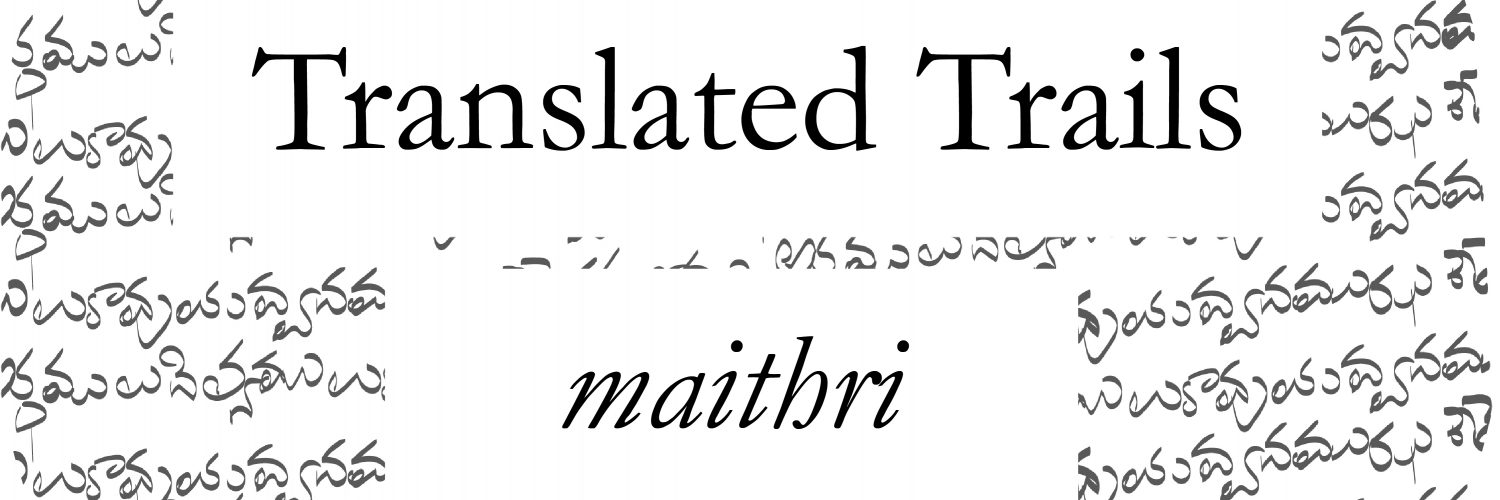Maatla1
the nascent dew drops gathered on the surface of the maatla
offering sweet dreams to the wind
there dwell several seas within the maatla
stirring and stirring with the alum
bubbling, the froth brews the hush of midnight
melting at the centre of the sea
as the jaggery softens –
she counts days and nights
through her transparent glance
For the daaru 2 to brew, she brought red clay
the seeds of the grass sown in which bloomed into rich green wings but –
but, their roots were bound breathless
suffocation in the maatla
doesn’t let her sleep
the rings on her fingers blossom
the coins eat the corn3
the glow of the coins reflect the rays
that attempt to split her palm
measuring the earth in footsteps
silently a shadow falls over it;
pirouettes,
immobile in dance –
the maatla spews froth
he digs out metaphors in the night,
and sprinkles them at the moon;
he smears his thirst
with sands of silver drawn out from the stars
the bubbling has started to disappear in the maatla
he seeks to dig himself, searching in nooks for any ounce of intoxication
as the sun draws close over the horizon
she stops painting half-way and makes her way back home
the maatla, with no words said,
settles down
devoid of energy
to greet the thickening honey within her
both under the blue skies
ready to transform from pollen to dust
consider this maatla their abode – melting,
slipping
to revolve around the maatla
the sun & moon can now join their hamlet
*
1 It is the pot used to brew saarai that ferments jaggery in water mixed with alum
2 Arrack
3 It is common for the women of the Lambaada tribe to wear silver rings with Indian currency coins on them; there used to be certain coins that had the symbol of corn engraved on them, a crop that is also staple to the tribe
*
మాట్లా*
మాట్లాకి బయిట కొత్తగా చిగుర్లెస్తున్న తడి
తియ్యని కలల్ని గాలికి బహుకరిస్తుంది
మాట్లా లోపల సముద్రాల్ని
పటిక రాయి చిలికించి చిలికించి
నురగ పొంగులో నిశీధి మౌనాన్ని అల్లుతూ
నడిసముద్రంలో కరిగిపోతుంది
కరుగుతున్న బెల్లాన్ని
కళ్ళ పారదర్శకతలోంచి నిరీక్షిస్తూ
ఆమె ఎప్పుడు లెక్క వేసుకుంటుంది
సారాయి కాయడానికి తెచ్చిన ఎర్రమట్టి గడ్డి విత్తనాలకు పచ్చని రెక్కల్ని ఇచ్చింది కానీ
వాటి వేర్లను ఊపిరాడనివ్వకుండా మూటగట్టింది
మాట్లాలోని ఉక్కపోత
ఆమెని నిద్రపోనివ్వట్లేదు
ఆమె చేతి వేళ్ళకు ఉన్న ఉంగరాలకు చిగురించిన
కాసులు మొక్క జొన్నల్ని ఆరగిస్తుంటే
కాసుల కాంతి ఆమె చేతి రేఖల్ని చీల్చడానికి యత్నిస్తుంది
చీకట్లో భూమి నడకని కొలుస్తూ
మౌనంగా తనపై రాలిన నీడని
దొర్లిస్తూ
కదలిక లేని నాట్యాన్ని నర్తిస్తూ
నురగలు కక్కుతుంది మాట్లా
అతడు నిశి తవ్విన రూపకాల్ని
చంద్రుడి వైపు చల్లుతూ
తన దాహాన్ని
నక్షత్రాల మిణుకులోంచి పోగుచేసుకున్న వెండి ఇసుకతో
పూత పోసుకుంటాడు
మాట్లాలోని పొంగు మాయమౌతుంటుంది
సారాయి కోసం అతను తనని తాను తవ్వుకుని ఏ ములైన ఇంత మత్తు దొరుకుతుందేమో
అన్వేషిస్తాడు
ఆమె సూర్యుడు దించిన తెరపై
కొత్త చిత్రాన్ని సగంలోనే ఆపేసి ఇల్లు చేరుకుంటుంది
మాట్లా మాట్లాడకుండానే కూర్చుంటుంది
దానిలోపల చిక్కబడుతున్న తేనెని పలకరించే ఓపికలేక
ఇద్దరు ఆ నీలి మేఘాల
పుప్పోడిలో ధూళిలా మారిపోవడానికి
మాట్లానే ఇల్లనుకుని కారిపోవ
జారీపోతారు
మాట్లా చుట్టూ తిరగడానికి
సూర్యచంద్రులు ఇప్పుడు తండాలోకి రావచ్చు
* సారాయి తయారీకి బెల్లం పటిక నీళ్లలో కలిపి పులియపెట్టే కుండ
Ramesh Karthik Nayak is a poet, based in Jakranpally Thanda, Telangana, India. He has published a poetry collection named ‘Balder Bandy’ in 2018 in Telugu. ‘Chakmak’ (Flintstones) is his first book in English. He belongs to the Banjara tribe (Lambadi) – a tribal community known as Schedule Tribe in Telangana and Andhra Pradesh. He writes poetry because out of the sheer love of writing. The themes of his writings revolve around his community (the Banjaara tribe) as there isn’t much literature out there that speaks of them.
The translation was done by Maithri for Chaaya Resources Centre, Hyderabad.









Very nice Maitri, as always. Karthik is a very good poet with fresh perspectives to offer. Maatla is good. In gujarati maatla is just any earthen pot. I think there is some similarity between these two languages. Karthik should tell. 👍